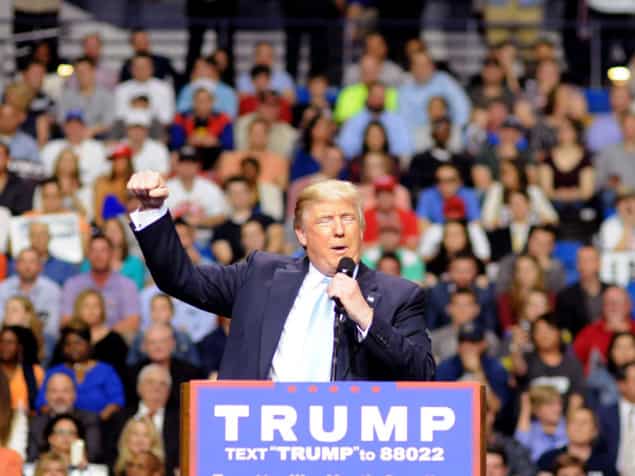With Donald Trump set to be inaugurated as US president on 20 January, scientists are voicing their concerns about his administration’s approach to science, as Peter Gwynne reports

The US scientific community has published a number of open letters calling on president-elect Don-ald Trump to support science as researchers come to terms with his surprise victory in November. The leaders of 29 US scientific societies, including the American Associa-tion for the Advancement of Science (AAAS), the American Institute of Physics, the American Physical Soci-ety and the American Astronomical Society, kicked off the process by urging the president-elect in late November to “quickly appoint a sci-ence adviser… who is a nationally respected leader with the appropri-ate engineering, scientific, manage-ment and policy skills necessary for this critically important role”.
A few days later, more than 2000 scientists, including physicists Dan-iel Kleppner and Wolfgang Ketterle and 20 other Nobel laureates, signed an open letter requesting that the president-elect and Congress “pro-vide adequate resources to enable scientists to conduct research in the public interest and effectively and transparently carry out their agencies’ missions”. Not to be outdone, last month more than 800 earth sci-entists urged “immediate and sustained action against human-caused climate change”.
Individual academic institutions and scientists have also added to the volume of letter writing. A missive by 400 researchers from the Massachusetts Institute of Technology (MIT) calls on Donald Trump to – among other things – “uphold the principles of the scientific method, of fact- and reason-based objective inquiry”. The heads of the 29 societies also offered to meet Trump or leaders of his team “to discuss how the science and engineering community can assist with developing a path forward to ensure that the US innovation infrastructure grows and flourishes”. As Physics World went to press, the group had yet to receive a response.
This administration came forward essentially by bashing the establishment; everybody fears that this means they will also deny established fact
The US scientific community is, however, still struggling to identify the appropriate contacts responsible for science and technology in the Trump transition team. While scientific societies and individual scientists have well-developed con-tacts with Congressional Republicans, those politicians, who will have a majority in both the House of Representatives and the Senate, have had little influence over Trump or his advisers, many of whom have little experience dealing with science policy.
“This administration came for-ward essentially by bashing the establishment; everybody fears that this means they will also deny established fact,” says Rush Holt, the physicist and former Congressman who is now chief executive of the AAAS. “Scientists who deal in evidence would like to think that politicians do too. Unfortunately they don’t. And the public didn’t show too much interest in sticking to evidence.”
Scientists have also been concerned by the identity of certain team members of the Trump transition team, as well as confirmed and leaked names of nominees for science-related posts in the administration. Climate change has hit a particular nerve, with the nomination of Scott Pruitt – the Attorney General of Oklahoma who asserts that scientists disagree about global warming – to head the Environmental Protection Agency (EPA) causing particular angst. “This pick threatens to undo the progress President Obama has made on climate change and protecting our natural resources,” says Representative Bill Foster, the Illinois Democrat who is the only physicist in Congress. “Scott Pruitt has a long history of representing the interests of the fossil-fuel industry at the expense of the long-term health of our planet and our fellow Americans.”
Media reports suggest, meanwhile, that the transition team is considering Republican Representative Thomas Massie, an engineer educated at MIT who is another climate change sceptic, as presidential science adviser while former Texas governor Rick Perry has been nominated as head of the Department of Energy (DOE). According to reports, the Trump transition team has also requested the identification of civil servants and contractors at the DOE who worked on the Paris climate change agreement as well as on efforts to reduce the US’s output of carbon dioxide over the past five years. The questions have raised fears that individuals involved in work on human-caused climate change might be marginalized by the new administration. Meanwhile a Trump adviser, James Carafano of the Heritage Foundation, has called for the elimination of the Office of Science and Technology Policy, headed by the presidential science adviser. His reasoning is that Trump has other sources of advice on science available to him.
Indeed, the transition team contains virtually no-one familiar to the scientific community to whom scientists can relate their concerns and advice. In the effort to do so, Holt says, the AAAS “is trying to do several things at once – reach out to the transition team, explain why we think that a strong science adviser would be beneficial, and explain why it’s important that there should be scientists distributed throughout the administration, as you never know where a crisis will occur”.
Yet whether that will be effective remains unknown. “We just don’t know [if it will be],” admits Holt. At the same time, several individual scientists are offering the transition team their help and suggestions. “Some scientists are almost lecturing to the new administration,” says Holt. “That will be counterproductive.”
The impact of the scientific lobbying effort remains to be seen. However, Neal Lane, a physicist and former presidential science adviser who is now a senior fellow at Rice University’s James A Baker III Institute for Public Policy, sees one sliver of optimism. “There are people in Congress, both Democrats and Republicans, who recognize the value of science,” he says. “One hopes they will ensure that science is respected and gets funded, and that peer review is recognized.”



